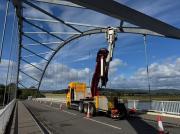Thousands of unsafe hoverboards detained over past seven weeks
7th December 2015
More than 17,000 self-balancing scooters - or hoverboards- have been examined at national entry points since 15 October due to safety concerns*. Of these, over 15,000 (or 88%) have been assessed as unsafe and have been detained at the border.
Officers at UK ports and borders have seen a huge spike in the number of these items arriving in recent weeks, destined to end up as gifts under the tree this Christmas.
Officers from National Trading Standards Safety at Ports and Borders Teams and trading standards services in Scotland have detained the boards - a must-have on Christmas lists this year - due to a range of concerns, such as safety issues with the plug, cabling, charger, battery or the cut-off switch within the board, which often fails. Many of the items detained and sent for testing have been found to have noncompliant plugs without fuses, which increases the risk of the device overheating, exploding or catching fire.
Products that have been tested have failed with significant safety issues and over 15,000 products detained have identical or very similar features to those already deemed as unsafe. With such large numbers being sent for testing since October many testing houses are full to capacity and additional staff training is underway to help meet the demand.
In recent months these faults have caused extensive damage to peoples property and National Trading Standards – in conjunction with the Department for Business, Innovation and Skills and the Chartered Trading Standards Institute – is urging consumers to be vigilant this Christmas and avoid putting households at risk with unsafe products.
Latest figures from National Trading Standards and trading standards services in Scotland reveal more than 15,000 self-balancing scooters detained at UK points of entry
Major safety risks identified include issues with the plug, cabling, charger, battery or cut-off switch
Lord Toby Harris, Chair, National Trading Standards, said: Our teams at sea ports, postal hubs and airports have seen a significant spike in the number of unsafe ‘hoverboards' arriving at national entry points in recent weeks and are working around-the-clock to prevent dangerous items from entering the supply chain. Protecting consumers from harm is our top priority and our Safety at Ports and Borders teams are preventing thousands of these unsafe items from being released onto the market every day.
We suspect that most of these products are being imported for onward sale domestically as Christmas approaches – we urge consumers to be on their guard when purchasing these products and advise you read our product safety checklist to help ensure you are not purchasing a dangerous item.
If you do suspect any sellers, websites or products of being unsafe we urge you to report them to the Citizens Advice consumer helpline on 03454 04 05 06
The Highland Council’s Trading Standards Team Leader Mark McGinty said: From a local perspective, we are on a state of high alert and so far have not experienced any unsafe hoverboards but are advising the trade and public to be vigilant when considering buying such products.
Nick Boles, Consumer Minister, said: "At this time of year, consumers are under pressure to get the best presents for their loved ones, however it is important that their safety is put above all else. Shoppers should think twice before choosing products from a site that does not appear genuine, and the checklist that National Trading Standards has produced is extremely useful. I urge anyone who suspects a hoverboard not to be genuine to report it to the Citizens Advice consumer helpline.
Leon Livermore, chief executive, Chartered Trading Standards Institute (CTSI), said: “Criminals and irresponsible manufacturers will often exploit high demand and attempt to flood the market with cheap and dangerous products.
“Consumers should not let a new fashion or craze cloud their judgement and remain vigilant at all times, to avoid taking home an unsafe product.
Some products that are made abroad, principally for the overseas market, are not fitted with the correct plug and fuse for use in the UK.
“As a minimum consumers should check that the three pin plug on the device states it is made to BS 1363. If it doesn’t include this information, then don’t buy the product.
Trading standards services take product safety extremely seriously but retailers must share this responsibility, to stop substandard products entering the marketplace.
Whether you already own one of these products or are purchasing for a loved one this Christmas, National Trading Standards has compiled the following top tips for consumers thinking of purchasing self-balancing scooters:
Never leave the device charging unattended – especially overnight: a faulty cut-off switch (designed to stop the battery from continuing to charge once fully charged) or a plug without a fuse, as seen in many products detained so far, could lead to the device overheating, exploding or catching fire.
Check the device: things to look out for include the shape of the plug – the first unsafe products identified often had a clover-shaped plug. Also check the device for markings or traceable information, such as the name and contact details of the manufacturer and / or importer.
If buying online, look closely at the website before you hit the ‘buy’ button:
Try searching for reviews of the product or the seller – do these seem genuine?
Are there lots of spelling or grammar mistakes on the site? This can be a clue that a business is not professionally run.
See if you can find out where the company’s head office is based – and whether that fits with how the website presents itself.
Do they have a landline number you can call if there are any problems? Bear in mind that if the company is based abroad, it can be more difficult to get a complaint dealt with or return a faulty product.
Read the small print – notice if anything seems odd, repetitive or in incorrect English.
Is there an ‘s’ at the end of the ‘http’ part of the web address, or is there a padlock symbol in the task bar? This means the website is using an encrypted system that keeps your details more secure.
Don’t be dazzled by a bargain: Are the prices incredibly low? If they look too good to be true, they probably are – particularly if some of your other checks have put doubts in your mind.
Be aware that criminals exploit high demand: When items like self-balancing scooters start to sell out at well-known retailers, the void is quickly filled by crooks churning out poor quality imitations that can put people in danger. Don’t ‘panic buy’ from the first website you find – do your usual common-sense checks.
Report it: National Trading Standards needs your help to clamp down on unsafe products from abroad. If you believe that any online or face-to-face seller is selling potentially dangerous goods, or something you’ve bought has made you suspicious, report it to Citizens Advice consumer service on 03454 04 05 06.
Buying online for onward sale online? If you do this you are assuming the legal responsibilities of a business to ensure that what you’re selling complies with product safety and intellectual property legislation. For information about this visit https://www.gov.uk/starting-to-import.
Related Businesses
Related Articles
Exciting Career Opportunities With The Highland Council Now Open For Applications
# 10 December 2025 Career opportunities with The Highland Council The Highland Council is looking to fill a variety of posts relating to civil engineering and flood risk management based in locations across the area. Included are opportunities specifically for civil engineering graduates and technicians, providing the ideal job with career progression for anyone recently qualified and ready for a varied and interesting role.
What the NC500 Research Projects Are Designed to Do - and Why They Matter for the Highlands
As the North Coast 500 approaches its tenth anniversary, it has become one of Scotland's most well-known tourism success stories. The 516-mile loop around the far north of the Highlands has been celebrated internationally, marketed as a world-class road trip, and credited with transforming visitor numbers in some of Scotland’s most remote areas.Help Shape the Future of Thurso
The Highland Council is inviting people that live, work, or study in Thurso, to come along to the public consultation events to have their say. This is an opportunity to help shape the future of Thurso, to gather views and ideas.
Are Scottish Councils Quietly Reversing Outsourcing? A Look at Insourcing, Cuts and the Highland IT Shift
A notable article in the Guardian on 6 December 2025 noted the high sums being paid by London councils outsourcing services to private firms. The article starts with the reduction in council funding by UK government since 2010.Council welcomes Visitor Levy flexibility plan
The Highland Council welcomes moves by the Scottish Government to introduce greater flexibility on how it could design a Visitor Levy Scheme for consultation. The Visitor Levy (Scotland) Act 2024 currently provides local authorities with discretionary powers to implement percentage-based levies following statutory consultation.Highland Council is reaching out for views to shape its next 26/27 budget.
As it looks to set out its forthcoming priorities, the council is seeking involvement from members of the public, including businesses, community groups, parents, and young people. All their opinions are going to be crucial in deciding how Highland Council will take on its budget challenge for 2026-2027.Have your say in Thurso's future £100million investment by attending public consultation events
Thurso is to benefit from £100m investment in education and community facilities and are rolling out the first phase of public consultations on 9 and 10 December 2025. The Highland Council is inviting people that live, work, or study in Thurso, to come along to the public consultation events to have their say; this is an opportunity to help shape the future of Thurso, to gather views and ideas.Finding new owners for empty homes - Scheme launched to help return more empty homes to active use
A new online portal has been launched to bring empty homeowners together with prospective buyers or developers with the aim of facilitating more properties to be used as homes again. Covering the whole of Scotland, this builds on the success of local pilots, referred to as "matchmaker schemes".Consideration for short term let control area in Skye and Raasay
Steps towards introducing a short term let control area have been considered by Highland Council's Isle of Skye and Raasay area committee. On Monday (1 December 2025) the committee heard evidence to justify the grounds for the introduction of a Short Term Let Control Area covering all or part of Skye and Raasay.Workforce North event spotlights Highland economy
EMPLOYERS and educators from across the Highlands have gathered to hear how a new initiative is aiming to transform the region's economy. Workforce North - A Call to Action brought together business leaders and teachers from primary and secondary schools from across the Highland Council area with a wide range of partners geared towards education, learning and skills development at Strathpeffer Pavillion.
